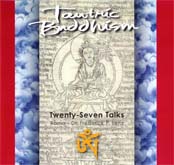
Tantric Buddhism
Professional Meditation
When a person has become used to meditating on a regular basis and the practice has become a part of your life, we reach a kind of threshold that some people don't cross.
Initially, when you begin to meditate, it's challenging, it's difficult just to get yourself to sit down once or twice a day to do it. Then you begin to see results. There's more energy in your life, your mind works better, your body feels better, things appear to be brighter, you have more enthusiasm, your awareness shifts, you start to become a little bit clairvoyant, you can see inside people, see inside yourself and you just see there's a rise of your power. Everything in your life begins to come together.
Then what happens is the practice becomes a practice. It becomes something that is a routine, and each meditation may be fulfilling and you don't stop because if you did, you'll notice the days are not as bright. So meditation becomes something that we have to do because the loss of it reduces our energy level. But it's not something that we do because we are making continuous breakthroughs. It develops a kind of functional autonomy.
There was a time we didn't meditate, and we obviously got by. Now we start to meditate and there's a brightness and an addition, but now the reason we meditate is not because we seek a greater brightness but simply because the loss of meditation will bring us to a lifestyle, an energy level, an awareness level that we find unacceptable.
So then, once we're meditating on a regular basis and that's become part of our life, if not the main focal point of our life - the meditation and all that implies - the issue is how to continually make breakthroughs in meditation. How never to let meditation become just a routine in our lives, something that we have to keep because we fear the loss of it as opposed to something that is each day taking us into realities of mind, taking us into warp drive, taking us through dimensions, changes, dissolutions of the self and so on that are each day more amazing than any day before.
Now that's realistic when you get into advanced practice. In the beginning, that's not realistic. You can't say, well, each meditation is going to be five times stronger than the day before because you have not yet developed the consistency of reaching a singular level. One day you'll do well, one day you won't. It's sort of like in sports, there's amateur and professional. An amateur is someone who one day is brilliant, the next day they're not. A professional is someone who demonstrates a consistency in brilliance. And their worst day will be about the best day of the amateur. They have their off days and their off seasons. But even when they're bad, they're consistently good. They're just not amazing.
Meditation is similar to that. In the beginning you're an amateur. This is once you're consistent and meditate once or twice a day for an hour, hour and a half a day. You're meditating consistently, but one day you'll have a great meditation, and then maybe for three days it'll just be so-so. And what I mean by that is not how you'll feel during the period of meditation, but how you will feel after you've meditated. During the period of meditation, it's not a good idea to evaluate your meditation. When you're running, you don't say, "Gee, this is a great run" or "This is a bad run." You just run.

